On this page:
- School history
- The uniqueness of the school
- • Individualization
- Specialists and their role
- Parents
- Curricula
- Montessori
- Teachers
- Students
- Extracurricular activities
- Lockdown
- New primary school
- Adaptation

School history
Our Kids: After your nursery and kindergarten, you created a primary school. How did this idea come about?
Zdzisława Kurek: We started with a kindergarten four years ago, then a nursery was established, and the next natural stage was creating a primary school. Our children's parents suggested that we establish a primary school so that those kids could continue their education in the same philosophy. We decided that it was a good idea, because until then the kids leaving our kindergarten couldn’t find such an institution in Wrocław.
The uniqueness of the school
Our Kids: What’s special about your school?
Zdzisława Kurek: There are several elements which distinguish us from others and which we are proud of:
• Non Violence Communication - NVC
Aleksandra Kilian: Non-violent communication is a type of communication that helps to eliminate all violence (verbal, physical, and emotional) by being open to others, learning about their needs, and building relationships. This communication awakens awareness, mindfulness, empathy, and responsibility in our relationships as well as a desire to change the world through giving and compassion.
We introduce our students to the world of nonviolent communication using the metaphor of a jackal and a giraffe. The jackal is a symbol of a violent way of communicating and the giraffe treats others with respect and compassion. This style of communication makes children learn to respect themselves and others.
Zdzisława Kurek: Recently, our entire staff has undergone further training in nonviolent communication. We train not only our staff, but also parents. Such workshops are needed because throughout our upbringing, we are exposed and get used to a very different type of communication.
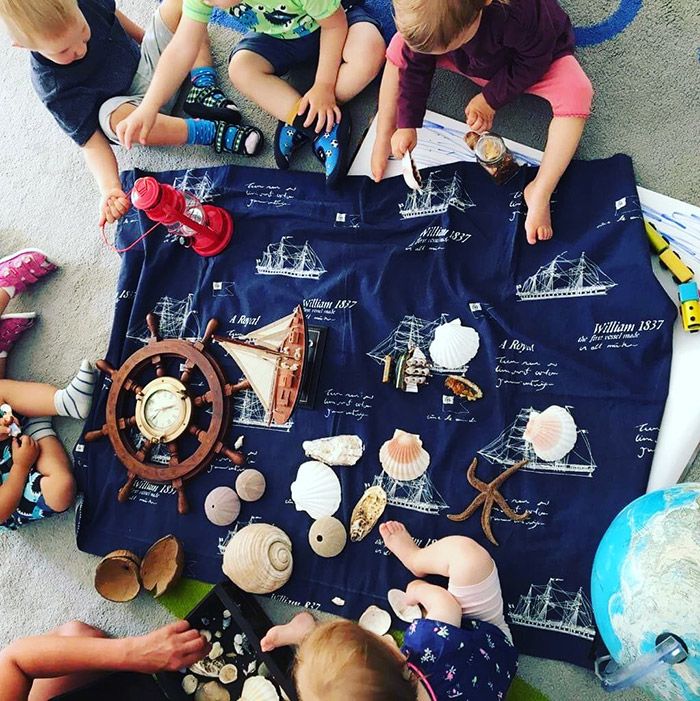
• Individualization
Zdzisława Kurek: An individual approach to each child is extremely important to us. In each of our preschool and school groups there are a maximum of 18 children who are at different stages of their cognitive, emotional, and social development. We do not assume a single standard for all of them, but we adjust the levels of tasks and other activities to the children participating in them. Our teachers are prepared to recognize individual differences between children and plan their teaching process accordingly. The situation is similar in special classes, e.g., in classes with a physiotherapist, because not all children exhibit the same level of motor development.
• Inclusive education
Aleksandra Kilian: This is a related topic—in our school there are children diagnosed either externally or by our own specialists as having special educational needs (including gifted children). All children are subject to holistic support, they are an integral part of their groups and enrich them with their uniqueness.
• Nutrition
Zdzisława Kurek: We offer delicious meals, which one mother described as "fancy." We have our own kitchen and we are careful about what we serve to our students. We care a lot about the diet. Parents may come to us and say that their child is not eating something, not because they don’t like it, in which case it’s not the reason to change their diet, but because, for example, it does not agree with their values, with something important to them. We offer all possible diets: vegan, vegetarian, gluten-free, and others. Our cooks are wonderful. We approach nutrition with great responsibility and care. There are no candy or sweetened drinks and we celebrate our birthdays with fruit not cakes.
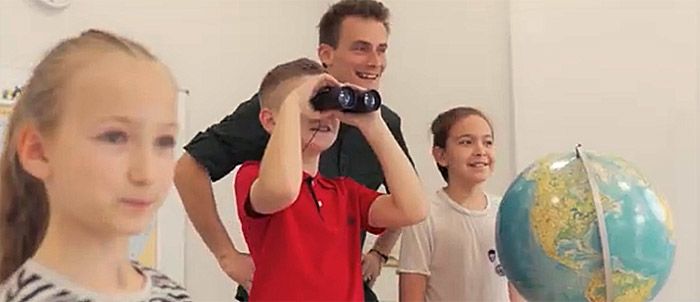
Specialists and their role
Our Kids: In your schools, as you mentioned, children and parents have access to specialists’ help and support.
Zdzisława Kurek: Yes, we have specialists who provide speech therapy, physiotherapy, and psychological services. They don’t come for just an hour or two, but are regular employees who are fully devoted to our children and know them very well. They provide specialist support to children, teachers, and parents. They meet regularly in their own group to discuss individual problems and therapeutic strategies.
Aleksandra Kilian: I am very proud of the cooperation between our specialists and teachers, because they work as one very well-coordinated team, always up to date with all matters, and they jointly develop a support plan for each child and their family. Our specialists conduct group classes for all children at FSA School, individual therapy sessions, and consultations for parents and teachers.
Parents
Our Kids: What is the role of and contact with parents at your school?
Zdzisława Kurek: At FSA School, we care very much about relations with parents. Parents co-shape our school and are part of many initiatives. We regularly offer them the opportunity to discuss issues that are important to them during consultations with the school principal.
Aleksandra Kilian: Our teachers and specialists also consult with parents at least once a month. It is a time to strengthen mutual relationships and exchange information on the children's development.
Zdzisława Kurek: We often hear from the parents that our work with children has had a positive impact on their family life. Such individual consultations with a psychologist or speech therapist sometimes have the character of psychotherapy sessions, and we hear from parents that they value this approach very much. We treat the child as a whole and we demand not only from them, but also from ourselves and parents. Our motto is let's see what we, adults can do and then let's demand from the child. I am very proud of it.
Aleksandra Kilian: In our school, we also make sure that parents are aware of what is implemented within our unique educational program. We periodically send them the so-called "Parent Pack," thanks to which they know what material is planned in a given period of the school year and which enables them to track their child's progress and support them in the required areas. Every Friday, parents receive worksheets on which teachers mark the strengths of their children with a green pen to emphasize what they are good at and to develop their motivation for further learning. At the same time, it is a discreet message for parents about what else needs to be worked on.
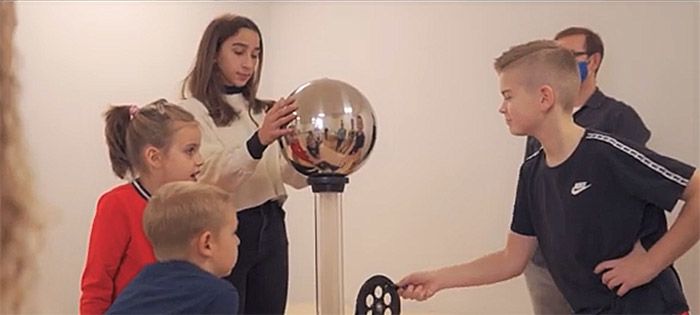
Aleksandra Kilian: We also support our parents through thematic workshops run by specialists. In the spring, I conducted 14 workshops on building resilience, and now I have started training the parents on nonviolent communication. Currently, during the pandemic, we meet parents on Zoom.
Zdzisława Kurek: When the pandemic ends and we can let outsiders enter the building again, we will continue in-person workshops for parents.
Curricula
Our Kids: You run two programs—Polish and English. How are you dealing with this?
Zdzisława Kurek: Yes, we combine the Polish and British core curricula. Our system was created in cooperation with professors of psychology and pedagogy and we consulted with people from the business world about it. We have worked to create a program that meets the goals of both core curricula, and at the same time is mindful of the child's needs. We work both for here and now and for the future that our children will create.
Aleksandra Kilian: This combination has resulted in a balanced curriculum in which the scope of the material and the pace of content implementation are adjusted to each child's abilities. Our school year is divided into sub-terms, between which there is a half term devoted to rest from curriculum work. During this time, children have the opportunity to get involved in educational projects and develop other competences, and to consolidate the knowledge gained in the previous weeks. We work in a cycle of eight weeks and then we have a one- or two-week break to start the next stage of learning with renewed energy.
For example, during such a break, we have a forest school. Children participate in interesting activities that awaken completely new skills: gardening, building bird feeders, and taking part in sensory workshops. It is a great opportunity to gain practical knowledge about the world and build the ability to cooperate.
Aleksandra Kilian: Our program is designed in such a way that children do not feel pressured during its implementation. We have two teachers assigned to each group who share responsibilities, ideas, and support each other. They have time to approach each child individually and work on areas that need more attention.
Zdzisława Kurek: It should also be emphasized that despite the individualization of the teaching process, we have everything planned very well and we operate according to very specific schedules. As we implement both the Polish and British core curricula, our schedules are much busier than, for example, in traditional kindergartens, which only implement the Polish curriculum. In our school, the emphasis is on education at a high level, systematized and based on reliable teaching methodology. We are far from the democratic school approach because we believe that it is the adult who defines the framework within which children operate and which ensures their safety and stable development.
In our opinion, a home is not for doing homework. What children learn at school should be enough. At home, let your child play. And for interested parents, we prepare additional materials to support the child's development.
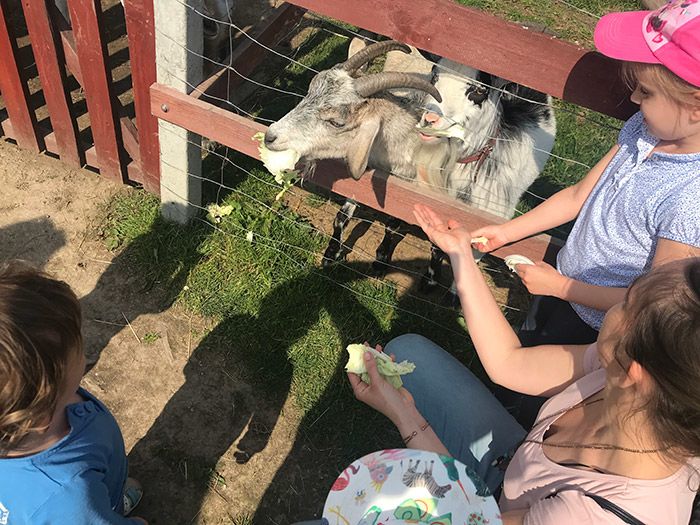
Montessori
Our Kids: From your materials we learn that you use Maria Montessori's teaching methodology.
Zdzisława Kurek: We rely on the methodology of Maria Montessori, but we do not use the entire method. One of the things we have adopted is avoiding overstimulation. When you enter our building, you can see that we are quite ascetic and that around us there is only what is absolutely necessary for our functioning. The same applies to noise—we approach children calmly and avoid loud stimuli. Even children who are not taught this form of communication quickly get used to and feel great with it. When we had the sanitary inspection, the inspectors couldn’t believe that there were 70 children behind the dining room door and another 50 were working in the classrooms next door. You couldn't hear the children and you couldn't hear the teachers.
Children can run out and scream in the playground, but in class we make sure that they use a calm voice, take into account how other people feel and how they would feel if someone yelled at them.
Sometimes the process of learning those ways takes long, but we think it's worth the time. Some children have excessive auditory sensitivity and we make sure they too feel comfortable with us. Moreover, silence helps to develop a rich inner life.
Aleksandra Kilian: The Montessori methodology derives from our philosophy of contact with the child and leading the child with full respect for their individuality, uniqueness, and their own learning style. The aim of our pedagogical activities is to awaken self-confidence and independence in children. We transfer knowledge using multiple methods adapted to the personality and potential of the child.
We also implement the elements of Maria Montessori's philosophy by conducting silence sessions before math or science classes to help children transition smoothly to concentration. We also organize Montessorian mornings and afternoons, where there is free music-making and contact with art.
Teachers
Our Kids: Who are the teachers in your school?
Zdzisława Kurek: We have Polish teachers with international experience. We also have a few teachers from abroad, and now, starting recruitment for Grades 1-6 of primary school, we will start working with native speakers qualified to teach the British curriculum, who will also be available to younger children’s groups.
Students
Our Kids: What children attend your school?
Zdzisława Kurek: We have children from Polish, Ukrainian, Serbian, Portuguese, Nepalese, Swiss, and Mexican families. These are parents for whom English is extremely important and often is also the main language used at home.
Extracurricular activities
Our Kids: What does school offer in terms of additional after-school activities?
Aleksandra Kilian: We have a very rich offer of extracurricular activities, but due to the pandemic restrictions, we cannot conduct classes that require cooperation with other institutions or persons from outside our school. However, we organized our own in-school football club and a music club.
Zdzisława Kurek: It is very important for us to be able to provide parents with a sense of security, so even when it was possible to ease certain restrictions, we did not do it and we did not allow people from outside the school into our building. Therefore, now that the restrictions have returned, nothing has changed for us. We care about safety and we want parents to feel that we make all our decisions carefully.
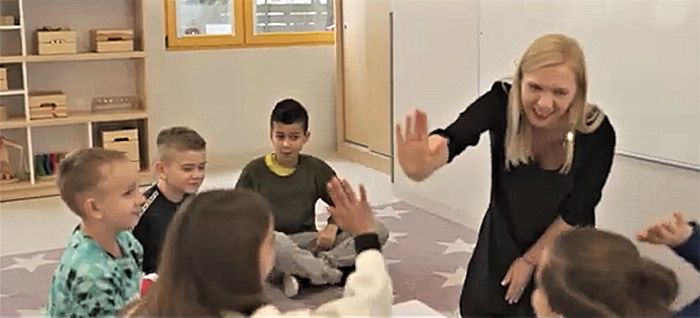
Lockdown
Our Kids: How did distance learning work at this education level?
Aleksandra Kilian: I must admit that our staff showed great mobilization, creativity, and commitment during distance learning. We ran a YouTube channel featuring videos recorded by our teachers. We also offered individual and group classes on Zoom. We sent parents packages of materials they could use. Communication with parents was very important to us. We supported our parents, and we wanted to have constant contact with them so they would know we were there for them.
Zdzisława Kurek: Looking at this time from a non-teacher's point of view, I must say that I will never forget it. Throughout the weekend before Monday, March 16, when our school closed, our team had been making videos. Then immediately, from Monday, from day one, our school started working at full speed. Everyone rose to the occasion and put in an extraordinary effort. I am very proud of our staff. We are not afraid of a new possible lockdown. We are prepared for such an option as we have everything carefully planned.
New primary school
Our Kids: Please tell me more about the plans for your new primary school.
Zdzisława Kurek: For our new children, already during the summer holidays, when the pandemic ends, we are planning a program to improve their English or Polish. We will organize a "summer camp" for children to have intensive experience with English through interesting, fun activities. And then we will start another year of great and unforgettable adventures at our FSA School.
Adaptation
Our Kids: Do you run continuous recruitment?
Aleksandra Kilian: Yes, recruitment lasts all year round and includes a carefully planned adaptation process. All new children have the opportunity to go through a three-stage adaptation so they are well prepared for their FSA school study. During the first stage, we have a meeting with the parents to get to know each other. In the second stage, our teachers and specialists diagnose the child's development so we can best prepare for the child’s admission. Language support is an important element of the third stage, which directly prepares the child to start studying at FSA School.
Zdzisława Kurek: The second stage is not intended to communicate to the candidate that our school is not a place for them, but is important for our school to provide the best care for the child by preparing the teachers and the classes. There is a place for every child at FSA School and that is why we want to get to know all the children well and take into account their specific needs and make them feel good with us from the very first moment.
People who read this also viewed:
- Poland education: grade levels
- Nursery schools
- Montessori nursery schools
- Montessori preschools
- Preschools in Warsaw
- Private & non-public preschools
- Poland education: grade levels
- Our Kids Interview: Get to know KIDS & Co.
- Private primary schools in Warsaw
- Private & non-public primary schools
- Social primary schools
- Private bilingual elementary schools in Warsaw
- Poland education: grade levels
- Our Kids Interview: Get to know The English Playhouse and The English Primary
- Our Kids Interview: Get to know Polish British Academy of Warsaw
- Private schools in Wrocław
- Our Kids Interview: Get to know Wrocław Cosmopolitan School (two interviews, new video)
-
Advice Guide
- ABC of educational terminology: Glossary of terms and concepts
- The admissions process
- Advantages and disadvantages of studying in an international school
- The application process
- Benefits of Polish private schools
- Bilingual schools
- Boarding schools
- Choosing a private or nonpublic school in Poland
- Compare schools in Poland
- English schools in Warsaw
- Homeschooling
- International schools in Kraków
- International schools
- Private school interviews
- Music education
- Myths about private education
- Non-public schools in Poland
- School open houses
- Our Kids Interview: Get to know EF Academy Oxford
- Our Kids Interview: Get to know Open School
- Our Kids interview: Get to know Regent College International Schools
- Our Kids Interview: Get to know The American School of Warsaw
- Our Kids Interview: Get to know The British School Warsaw
- Our Kids Interview: Get to know Wrocław Cosmopolitan School (two interviews, new video)
- Poland school profiles
- Private day schools
- Gifted schools & programs
- Private Jewish schools in Poland
- Language schools
- Private school tuition and costs in Poland
- Private schools in Poland
- Private schools in Poland offering French-language immersion
- English immersion schools
- Poland school uniforms
- Public versus non-public schools in Poland
- Private school questions
- Private school rankings
- Reasons for choosing private schools - Our Kids’s survey report
- Religious schools
- Schools and classes for children with ADHD in Poland
- Social Schools
- Special educational needs (SPE) certificates
- Special needs schools
- Study abroad at a private school
- The first annual non-public school fair in Poland
- The first annual Our Kids non-public school expo in Warsaw was a great success
- Third Private School Expo in Warsaw - summary
- Types of schools
- Types of schools in Warsaw
- Warsaw preschool costs
- Why private school?
- Why parents go private
-
Grades
- Boarding high schools
- Choosing a high school in Poland
- Mokotow High School Campus - a new Warsaw high school and Thames British School campus
- Montessori nursery schools
- Montessori preschools
- Our Kids Interview: Get to know FSA School
- Our Kids Interview: Get to know KIDS & Co.
- Our Kids Interview: Get to know Polish British Academy of Warsaw
- Our Kids Interview: Get to know The English Playhouse and The English Primary
- Poland education: grade levels
- Preschools in Warsaw
- Private & non-public preschools
- Private & non-public primary schools
- Private bilingual elementary schools in Warsaw
- Private high schools
- Private high schools in Warsaw
- Private middle schools
- Nursery schools
- Private primary schools in Warsaw
- Social high schools
- Social primary schools
-
Locations
- Boarding schools in Warsaw
- English schools in Kraków
- International Baccalaureate (IB) schools in Warsaw
- International schools in Warsaw
- Montessori schools in Warsaw
- Non-public schools in Warsaw
- Our Kids Interview: Get to know EF Academy
- Our Kids interview: Get to know Excellence in Education better
- Our Kids Interview: Get to know PRIMUS Non-Public Primary School No. 47 and Non-Public Secondary School
- Our Kids Interview: Get to know the Canadian School of Warsaw
- Our Kids Interview: Get to know The Primary and Secondary Schools of the Sisters of Nazareth in Warsaw
- Private Catholic and Christian schools in Warsaw
- Private day schools in Warsaw
- Private language schools in Warsaw
- Private schools in Bialystok
- Bydgoszcz schools
- Częstochowa schools
- Private schools in Gdańsk & Gdynia
- Katowice schools
- Private schools in Krakow
- Lublin schools
- Olsztyn schools
- Private schools in Poznań
- Private schools in Rzeszów
- Szczecin schools
- Private schools Warsaw
- Private schools in Wrocław
- Zielona Góra schools
- Private schools in Łódź
- Private special needs schools in Warsaw







 POL
POL CAN
CAN